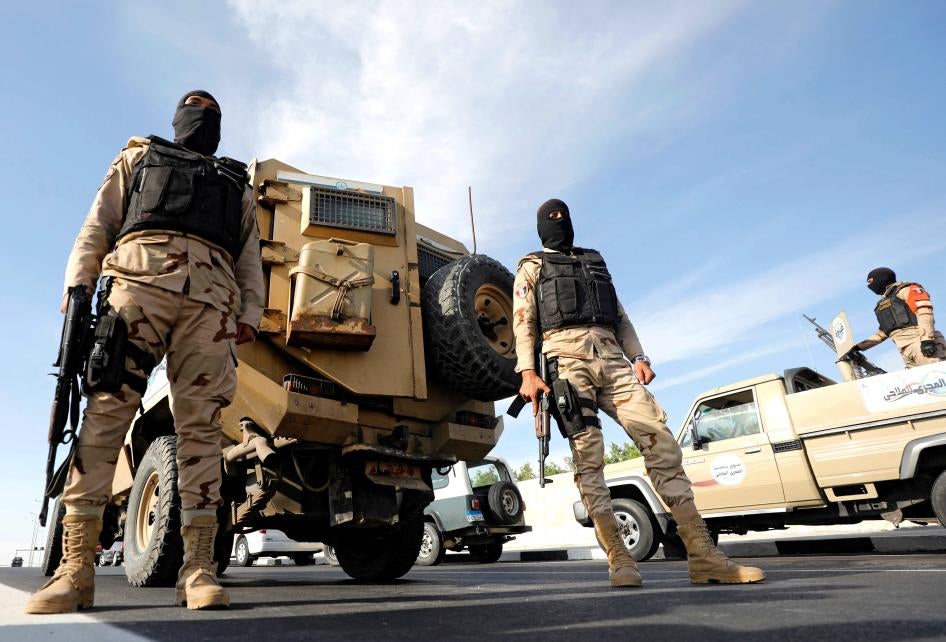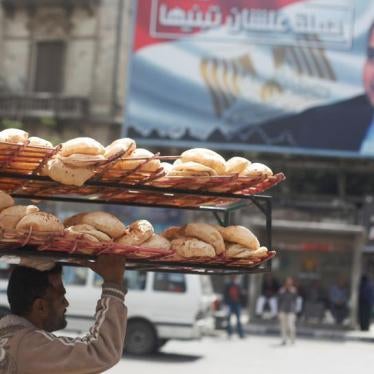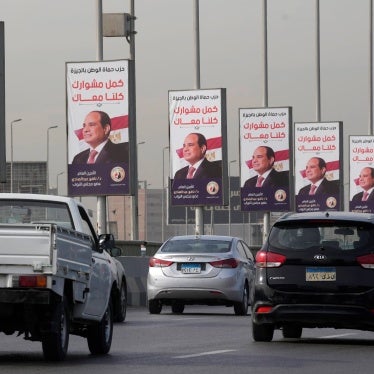(Beirut) – In early February 2024, the Egyptian authorities issued new legislation that will entrench and widen the already broad powers of the military over civilian life in a manner that undermines rights, Human Rights Watch said today. The new laws grant sweeping new authority for the military to fully or partially replace certain functions of the police, civilian judiciary, and other civilian authorities and further expand the jurisdiction of military courts to prosecute civilians.
On January 22, a new law and amendments to an existing law were presented by the government to the parliament, which swiftly approved them with little to no discussion or edits in one plenary session on January 28. The legislation includes Law No. 3 of 2024 on Guarding and Protecting the State’s Public and Vital Facilities and Buildings, which was published in the Official Gazette on February 4. Parliament also approved numerous amendments to Law No. 25 of 1966 on the Military Code of Justice that are expected to be published in the Official Gazette soon.
“Entrenching the military’s domination over civilian life is a strategy to contain increasing discontent over the Egyptian government’s dismal failures to uphold and ensure basic economic and political rights,” said Amr Magdi, senior Egypt researcher at Human Rights Watch. “Egypt’s financial crisis will not be solved by railroading increasing numbers of Egyptians through patently unfair military trials and locking them away.”
Law No. 3 tasks the armed forces with “assisting, and fully coordinating with the police, in guarding and protecting public and vital facilities and buildings including power stations, electricity lines and towers, oil fields, railway tracks, roads, bridges,” and “other comparable facilities.” The law provides military personnel involved in such operations with the same judicial powers of arrest and seizure as the police. It also stipulates that all offenses against or in relation to broadly worded “vital” public facilities and buildings are to be prosecuted in military courts.
This law contains broader, more abusive provisions than its predecessor, Law No. 136 of 2014, which President Abdel Fattah al-Sisi issued by decree in October 2014. His government used the 2014 law to prosecute thousands of civilians, including dozens of children, in military courts, often in mass trials ending in harsh prison or death sentences. Reflecting the chaotic, abusive nature of mass trials in which basic documents are not checked and individual criminal responsibility is frequently not established, a notable case in 2016 resulted in a life sentence against a 3-year-old defendant that, following an outcry, a military spokesperson later said was issued by mistake.
The 2014 law said that it would apply for only two years. The government justified it saying the military trials were necessary to address waves of violent attacks on government facilities during that period. However, in 2016, the law was extended for five additional years, and then in October 2021 the law’s provisions were made permanent.
A significant new element in the new law grants military personnel the authority to inspect and search places, arrest people, or confiscate materials for the purpose of confronting “offenses that harm the basic needs of the society including food commodities and essential products.”
The new authority is to “preserve the fundamental pillars of the state, the people’s gains and rights, or national security as determined according to decrees by the president or his delegated deputy after consulting the National Defense Council.” This unprecedented broad language invites further military intervention into civilian governance and everyday life, giving the president and his generals a free hand to define threats to national security, Human Rights Watch said.
The new law also grants the defense minister the power to determine numbers, locations, tasks, and distribution of military personnel “as required by the nature of their work inside those vital and public facilities and buildings.” This provision could be utilized to permanently deploy military personnel at civilian government facilities, which can undermine their independence, or lead to abusive crackdowns by military forces on peaceful assemblies near such facilities.
The “food commodities and essential products” mentioned in the law to be protected by the military include food, non-alimentary, and fuel products that are government subsidized for low-income citizens. They usually include food such as bread, rice, lentils, sugar, flour, beans, and cooking oil; home essentials such as soaps and laundry detergents; and fuel such as home-used butane gas cylinders. The Ministry of Supply and Internal (Domestic) Trade oversees the supply and purchase of these products and their subsidized prices, while investigating and detaining those responsible for market violations normally lies within the Supply and Trade Administration, part of the Interior Ministry’s police.
Parliament members, government officials, and pro-government media reports have all said that the law’s new language around food and commodities aims to give the military the power to intervene to control markets against “manipulation,” indicating that the law could be used to target people involved in what the authorities perceive as economic-related offenses, such as monopolies, or trading hard currency on the black market.
Egypt is facing a soaring fiscal crisis and skyrocketing food prices on top of multi-year economic downturn. President al-Sisi’s government has consistently responded to dissent and criticism by harassing and jailing critics of its political and economic choices that have led to rising poverty and unprecedented foreign debt as well as those who have criticized the rapid expansion of opaque, giant military-owned businesses. In recent weeks, numerous videos emerged on social media showing citizens complaining about their inability to meet their basic needs for food and commodities as prices increased almost daily as well as the foreign currency crisis that has dramatically devalued the Egyptian pound.
Amendments to the Military Code of Justice include adding to the military courts’ jurisdiction crimes committed against “public and vital facilities and public properties, and other comparable things, that are protected by the armed forces.” Other amendments introduced new military appeals courts for major offenses, following the template of a similar change in January made to the civilian court structure. Previously, appeals in cases of major offenses in military courts went directly to the Military Cassation Court, the military counterpart of the Cassation Court in the civilian justice system.
While increasing opportunities for legal appeals could be a positive change, it does not alter the well documented abusive record of military courts, their lack of independence, and their inability to uphold the right to a fair trial. The motivation appears to be increasing the military judiciary’s capacity to replace the function of the civilian court system rather than limiting its mandate to military staff, Human Rights Watch said. The amendments introduced a new entity within the Defense Ministry to oversee military courts, but they did not change the nature of military judges as serving military officers who are subject to the Defense Ministry’s laws regulating issues related to hierarchy, promotion, discipline, and general work.
The Parliament speaker, Hanafy El Gebaly, and other officials have said that the Defense Ministry introduced the amendments to meet its “constitutional duties,” highlighting the fact that various constitutional amendments and laws in recent years have expanded the military’s ability to intervene in political life. These include, for example, an amendment to constitutional article 200, in 2019, that gave the military the duty to “protect the constitution and democracy, and safeguard the basic components of the State and its civilian nature, and the people’s gains, and individual rights and freedoms.” In analyzing those amendments, Human Rights Watch said then that they would significantly expand the military’s authority.
Since President al-Sisi, as then-defense minister, led the July 2013 military coup against late President Mohamed Morsy, exploiting public dissatisfaction with Morsy’s administration to justify his forcible removal, the military has increasingly emerged as the dominant state institution. It has also dramatically expanded its economic role, operating mega projects across vast commercial sectors.
Human Rights Watch strongly opposes trials of civilians before military courts in all circumstances, as their proceedings frequently severely undermine due process rights and because of how authoritarian governments have used them to punish peaceful dissent. The United Nations Human Rights Committee has expressed concerns about military trials of civilians in Egypt as early as in 2002, even though back then they were a much smaller scale.
The African Commission on Human and Peoples' Rights, in interpreting the African Charter on Human and Peoples' Rights, has said that military courts “should not, in any circumstances whatsoever, have jurisdiction over civilians.” It said that even when military courts follow guidelines for fair trial guarantees – as they always should – their “only purpose” should be in “offenses of a purely military nature committed by military personnel.”
“Instead of revisiting political and economic policies that have undermined the political and economic human rights of millions of Egyptians, President al-Sisi’s government has enhanced the military’s political and economic power,” Magdi said. “The armed forces should not be pitted against their own peoples’ hopes for dignity, bread, and freedom.”









